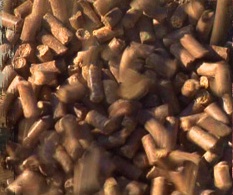
Features
Alternative Fuels
Energy
Growing fuel potential of agro-biomass
January 26, 2009 By the Canadian Bioenergy Association
 Jan. 26, 2009, Kingston, Ont. — Building regional agricultural
Jan. 26, 2009, Kingston, Ont. — Building regional agricultural
co-operatives to supply agro-biomass to industry is a huge opportunity
waiting to happen, says Paul Kennedy, an Ontario landowner.
Jan. 26, 2009, Kingston, Ont. — Building regional agricultural co-operatives to supply agro-biomass to industry is a huge opportunity waiting to happen, says Paul Kennedy, an Ontario landowner.
“There are 142,833 acres of arable land in Lennox & Addington County, near Kingston, alone. If you wanted to reduce coal burning in a company like Lafarge by 10 per cent, only 2.5 per cent of L&A County’s arable land would be required to produce energy crops or collect agricultural residues. There are also thousands of bales of hay sitting unused on local farms, all of which can be converted to fuel pellets,” says Kennedy.
The problem?
Municipalities and farmers need co-operative models so they can build a bulk supply and stable supply chain for industry. Export pellet markets are there, but supply chains to manufacture and deliver agricultural pellets are not. Machinery for making and collecting residues or energy crops is new and unfamiliar to some landowners.
But from Missouri to the Finland, farmer co-operatives producing agro-pellets from leftover crop waste or dedicated energy crops are turning a profit. “Substituting some fossil fuels with bioenergy not only cuts carbon emissions, it’s also a great business opportunity for Canadian farmers,” says Douglas Bradley, president of the Canadian Bioenergy Association.

|
| Show-Me Energy Co-operative |
That’s why it is hosting “Fueling Canadian Industry with Agro-Biomass,” a focused workshop at the Donald Gordon Centre at Queen’s University on March 31, 2009. CANBIO is partnering with industries such as Ontario Power Generation and Lafarge , and with R&D experts like Queen’s University’s Sustainable BioEconomy Centre and the Ontario Ministry of Agriculture, Food and Rural Affairs, to help farmers, land owners and municipalities get started in the bioenergy business.
OPG and Lafarge, co-sponsors of the workshop, will talk about their immediate and future demands for renewable fuels. Steve Flick, founder of Missouri’s renowned Show-Me Energy Co-operative and Craig Copeland, a local farmer and landowner, will show delegates how a co-operative will financially benefit all area farmers and reduce carbon emissions. Experts from the workshop sponsor, the Queen University’s world-leading Sustainable BioEconomy Centre, will look at the economics of agro-feedstocks for energy and the role policy can play.
Learn about a small Canadian pellet machine that can produce agro-pellets on-site from Ekofuels Technologies, and CANBIO president Doug Bradley will talk about export markets and how to build a business plan.
The workshop costs $120, if participants register in advance, and CanBio members receive a discount. For more information and to register, visit www.canbio.ca.
Print this page